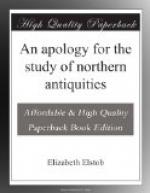+Ex hou de: ta pro:ta diaste:te:n erisante.+
Here are four Monosyllables in this Verse,
+Te:n d’ ego: ou luso:, prin min kai ge:ras epeisen.+
Here are six Monosyllables, and one cutting off.
+All’ ithi, me: m’
erethize, sao:teros ho:s ke nee:ai.
Hos e:de: ta t’ eonta, ta t’
essomena, pro t’ eonta.+
Hom. Il. I. l. 70.
Here are seven Monosyllables; yet so far is Virgil from being angry with his Master Homer on this Account, that he in a manner transcribes his very Words, imitating him as near as the Latin wou’d permit;
Quae sint, quae fuerint, quae mox ventura trahantur.
Here is the whole Sense of Homer exprest, and five Monosyllables. But Mr. Dryden, who has exprest the Sense of Virgil with no less Accuracy, gives you the whole Line in Monosyllables;
He sees what is, and was, and is to come.
Mr. Pope is equally happy in the Turn he has given to the Original, who as he is an exact Master of Criticism, so has he all those Accomplishments of an excellent Poet, that give us just Reason to hope he will make the Father of the Poets speak to us in our own Language, with all the Advantages he gave to his Works in that wherein they were first written, and the modest Opinion he prescribes to his own, and other Mens Poetical Performances, is no Discouragement to these Hopes;
Whoever thinks
a faultless Piece to see,
Thinks what ne’er was,
nor is, nor e’er shall be.
And Horace, while he is teaching us the Beauties in the Art of Poetry, gives no less than nine Monosyllables in the compass of a Verse and a half;
Sed nunc non erat his
locus: & fortasse cupressum
Scis simulare. Quid
hoc si, &c.
Now if these are Beauties, as I doubt not but the politer Criticks will allow, I cannot see why our Language may not now and then be tolerated in using Monosyllables, when it is done discreetly, and sparingly; and as I do not commend any of our Moderns who contract Words into Monosyllables to botch up their Verses, much less such as do it out of Affectation; yet certainly the use of Monosyllables may be made to produce a charming and harmonious Effect, where they fall under a Judgment that can rightly dispose and order them. And indeed, if a Variety and Copiousness of Feet, and a Latitude of shifting




